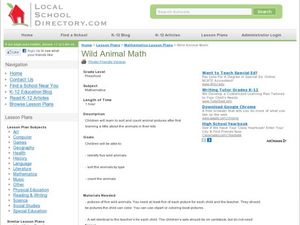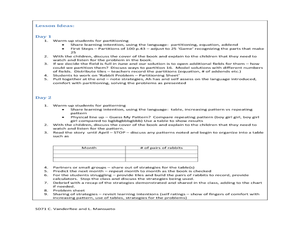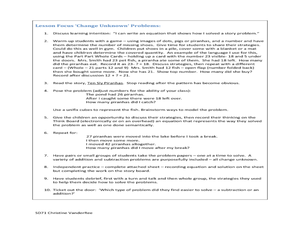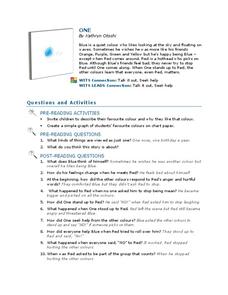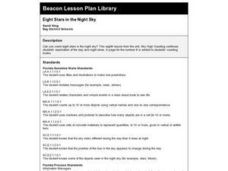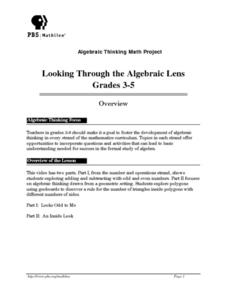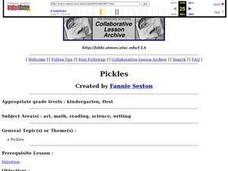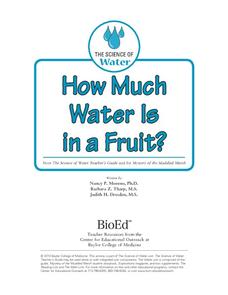Curated OER
Wild Animal Math
Students examine wild animals. In this sorting and counting lesson, students are introduced to animals by viewing pictures. Students discuss the sounds they make, where they live and what they eat. Students pretend to be the animals....
Curated OER
Literature/Math Crossover Lesson Plan - Word Problems
First graders, after listening to the story I Can Lick 30 Tigers Today! think of a word problem of their own. They do this at their desks in their pre-assigned learning groups.
Curated OER
Egg Carton Math
Students recognize numbers 1-10 from a flash card held by the teacher and put the amount of beans in an egg cartoon that corresponds to the number the teacher holds up. After a lecture/demo, students play the game on their own.
Baylor College
Measuring and Protecting Skin
Several subjects are addressed within the context of a science lesson about the sun's ultraviolet rays. Elementary earth scientists consider protection of the skin with sunscreens (health), estimating and measuring surface area or an...
Baylor College
What Dissolves in Water?
One of water's claims to fame is as the universal solvent. Young physical scientists experiment to discover which materials dissolve in this special compound. You could never be more prepared for teaching this lesson than by using this...
Curated OER
The Role of Money
Fourth graders examine the role of money. In this money lesson, 4th graders read a chapter from Judy Blume's, Double Fudge, to see how money is made and how people make money. They finish a worksheet, and play a game about money.
Curated OER
Creating Groups and Sorting
Students practice classifying. In this classifying and oral language lesson, students listen to the story My Big Truck Book by Roger Priddy and identify similarities between the trucks described. Students sort the children in their class...
Curated OER
Numeral Recognition, Matching, and Writing
Students engage in a instructional activity in which the teacher can evaluate, reinforce and reteach numeral recognition, one to one matching and the writing of numerals from 1-20. 'Anno's Counting Book' is used to kick off this...
Curated OER
The Rabbit Problem
Young scholars notice a number pattern in the book The Rabbit Problem by Emily Gravett. In this number pattern lesson, students represent and describe numbers appropriate to their grade level.
Curated OER
Identify Plane Shapes and Solid Shapes
First graders explore the math concept of geometric shapes. For this plane shapes and solid shapes lesson, 1st graders examine visual examples. Students also practice solving problems that their instructors model.
Curated OER
Centipede's 100 Shoes
Young scholars solve equations with the help of their teacher. In this simple equations lesson, students listen to the story Centipede's 100 Shoes by Tony Ross and use the scenarios given in the book as addition and subtraction problems....
Curated OER
Ten Sly Piranhas: A Counting Story in Reverse
Students solve related addition and subtraction problems. In this addition and subtraction lesson, students use the book Ten Sly Piranhas by William Wise as the source of word problems for students to solve.
Curated OER
Primary Counting Skills
Class members drill and practice counting skills from 1 to 20. They count along with a puppet and when the puppet makes a mistake, they correct it. In pairs, they connect cubes to make a train and count the number used. On the last of...
Curated OER
Equal Shmequal by Virginia Kroll
Students read a book and complete exercises to explore the meaning of 'equals.' In this equal numbers lesson, students brainstorm the meaning of equals and read a story about the topic. Students use manipulatives to study balance and...
Curated OER
One Hundred Hungry Ants
Primaries read the book One Hundred Hungry Ants and solve word problems based on the book. In this word problems lesson plan, students will be able to find the factors of a number by organizing counters into equal rows.
Curated OER
One
First graders listen to the story One and design a favorite color graph. In this language arts lesson, learners answer comprehension questions and discover the importance of standing up for a friend. They complete a worksheet about...
Curated OER
Ten
Students create their own counting book and brainstorm ideas with each other for a concept. In this counting lesson plan, students first read books such as Ten by Keith Haring.
Curated OER
One is a Snail, Ten is a Crab.
Young scholars count by pairs and sets of feet, while reading a story that coincides with this practice. In this math instructional activity, students use their skills to count by multiples and adding on to numbers when they add up feet...
Curated OER
Eight Stars in the Night Sky
First graders explore the day and night sky. They complete a number 8 page for their counting books.
Curated OER
Looking Through the Algebraic Lens
Students work with rectangles to find generalizations for adding and subtracting odd and even numbers in part one of the lesson. In part two, students use geoboards to construct polygons, look for patterns, and find a general rule.
Curated OER
Pickles
Young learners compare healthy foods to junk foods. They examine the growing process of a vegetable from a seed all the way to maturity. The book, The Magic School Bus in a Pickle is used. Some nice cross-curricular activities in math,...
Curated OER
Exploring Regions of Our World
Examine how climate and landforms affect plants and animals that live in particular areas. Discover that these same factors affect peoples' homes, jobs, and recreational activities. Pupils research ecosystems and biomes, and then write...
Curated OER
Where We Live
Who has the most? Young learners practice charting data using familiar information. They help fill out a classroom chart by recording the number of people, pets, televisions, etc. in their home. Guiding questions help them investigate...
Baylor College
How Much Water Is in a Fruit?
Compare the volume of an orange to the volume of liquid that can be extracted out of it. Also compare the mass of an apple before and after it has been dried out. In both of these activities, children find that there is an appreciable...
